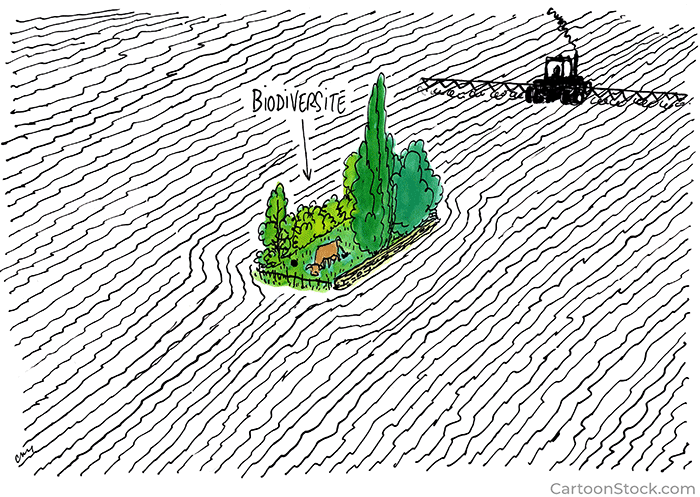The newsletter of the SDC Agriculture & Food Systems Network provides you with the latest news submitted by the network members four times a year: projects, publications, events, network activities - everything to do with food systems. Feel free to subscribe by clicking the button on the right (network members are automatically subscribed).
Latest issue: December 2023

Members' Articles |
News |
Events |
Who is who |
Comic
Editorial
Dear Reader,
As this year is coming slowly but surely to an end, it is my pleasure to share the 4th and last edition of this year’s Food Systems Newsletter with you.
Looking back on an event-full year, the AFS-team sends a big thank-you your way, for your contributions, support and conversations. From the Food Systems Learning Journey to the Face-to-Face-Meeting in Rome as well as a diverse set of Thoughts-for-Food-Webinars and many more exchanges, the engagement from and within our AFS-network was remarkable and we really appreciated all these fruitful interactions with you.
This winter-edition of the AFS-newsletter is one of the most exhaustive editions we have published so far – thank you for all your contributions, we are happy and grateful for the positive resonance the newsletter is receiving!
For this edition we zoom in on three thematic focus areas: Climate Change Adaption, Smallholder Farmers and Organic Production. Furthermore, we have many interesting news from around the world: from initiatives to new publications and recent events. And last but not least: check out the “Recent Publications”-section for some interesting articles from SDC and the UN Special Rapporteur on Health.
As my traineeship with the SDC is coming to an end, I also want to take this opportunity to say goodbye as your editor of this newsletter. I greatly enjoyed getting to know you (some virtually, some even in person) and I want to thank you for the ongoing efforts for this network. As I’m not leaving SDC yet, I hope other possibilities will arise to interact with one another. In that spirit: Thank you and see you soon!
Take care and happy holidays!
All the best,
Lara
 Lara Sponagel
Lara Sponagel
Academic trainee, Section Food Systems, SDC
LinkedIn | lara.sponagel@eda.admin.ch
Members' Articles: Focus climate change adaption
Conserving and regulating water in the Andean context:
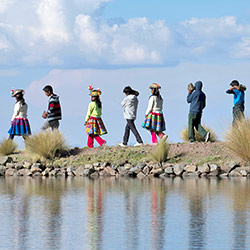 In the Andes climate change is leading to the reduction and disappearance of glaciers and changing precipitation patterns. This is affecting water availability for human consumption and use in highly vulnerable family agriculture. This article focuses on two local adaptive responses, namely, Ecuador's Water Protection Areas and Peru's water harvesting and planting initiatives. Both will be presented at COP28.
In the Andes climate change is leading to the reduction and disappearance of glaciers and changing precipitation patterns. This is affecting water availability for human consumption and use in highly vulnerable family agriculture. This article focuses on two local adaptive responses, namely, Ecuador's Water Protection Areas and Peru's water harvesting and planting initiatives. Both will be presented at COP28.
 Ana María Vela
Ana María Vela
Helvetas Swiss Intercooperation
LinkedIn | anamaria.vela@helvetas.org
 Lenkiza Angulo
Lenkiza Angulo
Helvetas Swiss Intercooperation
lenkiza.angulo@helvetas.org
 Maria Gracia Aguilar
Maria Gracia Aguilar
Avina Foundation
LinkedIn | mariagracia.aguilar@avina.net
Read the full article
The tropical Andes, crucial for global biodiversity, face extreme risks due to environmental changes, where combined effects of land cover and use change and climate change impact family farmers and societies dependent on the food and water provided by Andean ecosystems.
In late 2020, the first phase of the Andes Resilientes al Cambio Climático project began, facilitated by the consortium Helvetas Swiss Intercooperation - Avina Foundation and funded by Swiss Cooperation COSUDE. Andes Resilientes promotes climate resilience for the most vulnerable rural populations in the high Andean ecosystems of Bolivia, Ecuador, and Peru, fostering inclusive adaptation from the design and implementation of policies, programs, and strategies to the strengthening and scaling of good adaptation practices contributing to improving food and water security for these populations.
The project collaborates directly with the ministries of environment, agriculture, and economic and social inclusion, in coordination with strategic processes in these countries, such as water security in the context of climate change, within which the experiences of Ecuador and Peru have been developed.
Ecuador and the management of Water Protection Areas
Water Protection Areas (WPA) are a legally established conservation measure in Ecuador designed to ensure the maintenance, conservation, and recovery of water for local populations and the safeguarding of key watershed areas and their surrounding ecosystems.
The Constitution of Ecuador supports the country's water protection. Its designation legally safeguards forests and other natural ecosystems from exploitation activities such as mining, ensuring a clean water supply for local communities. The protection of water sources also preserves the biological and cultural diversity of these areas.
A national hydrological study conducted between 2019 and 2022, commissioned by the Water Secretary and now the Ministry of Environment, Water, and Ecological Transition (MAATE), identified strategically high-priority zones for water source protection throughout the country, covering approximately 7 million hectares. To date, 27 Water Protection Areas (WPA) have been established in Ecuador, totaling 192,785.23 hectares of water protection.
Local management requires planning tools to define actions and local projects for the conservation and recovery of water resources, as well as mechanisms for local and community governance (water technical tables) to coordinate the actions of various actors and strengthen the management of WPAs. There is also a need for capacity-building spaces for local authorities and community leaders (water schools) to undertake effective management ensuring water quality, quantity, and safety.
As part of this process, with the guidance of the Ministry of Environment, Water, and Ecological Transition (MAATE), and the support of Andes Resilientes and its local partner Grupo Social FEPP, pilot actions were implemented in two WPAs (Santa Elena in the province of Cotopaxi and San Simón de Quinllunga in the province of Bolivar). These actions aimed at formulating their technical management plans, integrating climate action and gender criteria, establishing water technical tables, and developing water schools. These experiences have produced and tested methodologies that are being institutionalized by MAATE for replication in all WPAs in the country.
There is a growing awareness of the importance of preserving water-producing territories. The San Simón de Quinllunga WPA would not exist if it were not for the determined intervention of 9 beneficiary communities that joined forces to purchase the territory where the Quinllunga paramo is located, preserving it and integrating it into the National System of Water Protection Areas.
Peru and water seeding and harvesting to enhance Andean family agriculture in the context of climate change.
Water seeding and harvesting, known in Peru mainly as water recharge actions, encompass various practices carried out in the headwaters to capture rainwater, retain it, and infiltrate it into the soil and subsurface to recharge groundwater (water seeding). This includes actions such as building qochas, amunas, infiltration ditches, recovering and managing pastures, conserving bofedales, afforestation, and reforestation, among others. The goal is to make the captured water available for agricultural production during dry periods (water harvesting) through the construction of reservoirs, among other measures.
These actions, rooted in indigenous ancestral knowledge and practices of water management, now strengthened with modern technical knowledge, and focused on generating nature-based solutions, have gained momentum in Peru as a response to water scarcity conditions caused by accelerated environmental degradation in Andean and Amazonian basins, driven by socio-environmental effects and exacerbated climatic variability due to climate change.
The current relevance of the topic is the result of an evolutionary process. Fifteen years ago, Swiss cooperation, through the Climate Change Adaptation Project (PACC), supported communities and local governments in the Cusco and Apurímac regions in developing small-scale actions. These, along with other multiple local experiences initiated by various actors, contributed knowledge about the effectiveness of these practices. In 2016, they became part of a knowledge management process driven by the Ministry of Agriculture of Peru and supported by PACC as a basis for designing a National Water Seeding and Harvesting Program, leading to the creation of the Sierra Azul Executive Unit in this sector, responsible for promoting and supporting these actions.
Between 2017 and 2023, the Sierra Azul Executive Unit achieved the conditioning of 39,000 hectares for water seeding and harvesting, and the storage of 78,603,436 cubic meters of water
Peru and water seeding and harvesting to enhance Andean family agriculture in the context of climate change.
Water seeding and harvesting, known in Peru mainly as water recharge actions, encompass various practices carried out in the headwaters to capture rainwater, retain it, and infiltrate it into the soil and subsurface to recharge groundwater (water seeding). This includes actions such as building qochas, amunas, infiltration ditches, recovering and managing pastures, conserving bofedales, afforestation, and reforestation, among others. The goal is to make the captured water available for agricultural production during dry periods (water harvesting) through the construction of reservoirs, among other measures.
These actions, rooted in indigenous ancestral knowledge and practices of water management, now strengthened with modern technical knowledge, and focused on generating nature-based solutions, have gained momentum in Peru as a response to water scarcity conditions caused by accelerated environmental degradation in Andean and Amazonian basins, driven by socio-environmental effects and exacerbated climatic variability due to climate change.
The current relevance of the topic is the result of an evolutionary process. Fifteen years ago, Swiss cooperation, through the Climate Change Adaptation Project (PACC), supported communities and local governments in the Cusco and Apurímac regions in developing small-scale actions. These, along with other multiple local experiences initiated by various actors, contributed knowledge about the effectiveness of these practices. In 2016, they became part of a knowledge management process driven by the Ministry of Agriculture of Peru and supported by PACC as a basis for designing a National Water Seeding and Harvesting Program, leading to the creation of the Sierra Azul Executive Unit in this sector, responsible for promoting and supporting these actions.
Between 2017 and 2023, the Sierra Azul Executive Unit achieved the conditioning of 39,000 hectares for water seeding and harvesting, and the storage of 78,603,436 cubic meters of water in 17 regions of the country. The theme is also promoted by the AgroRural Executive Unit of the current Ministry of Agrarian Development and Irrigation (MIDAGRI), through the project "Improvement of the Water Recharge Service and Use of Rainwater" in 70 micro-watersheds in 14 departments.
In 2019, the topic gained top priority with the approval of a law declaring water seeding and harvesting a matter of national interest and public necessity, also becoming a prioritized adaptation measure with targets to achieve by 2030.
In 2022, to mobilize public investment resources to expand these actions, MIDAGRI developed and approved "Guidelines for the formulation and evaluation of investment projects in the water seeding and harvesting typology," aiming to achieve water security, develop resilience to climate change, and contribute to sustainable and equitable socio-economic development.
The implementation of these guidelines is following an extensive process of dissemination and training for officials and professionals at the national, subnational, and local levels in 7 departments of Peru, to form a portfolio of 25 investment projects, for which MIDAGRI is committing resources. This process is in collaboration with the Andes Resilientes project of COSUDE, facilitated by the Helvetas-Avina Foundation consortium, and the PNUD BIOFIN Initiative.
For the period 2024-2030, the country has set a goal of constructing 5,256 projects to condition 51,545 hectares for water seeding and harvesting and storing 187,306,616 cubic meters of water in 17 regions, with an investment of 1,716 million soles, to be executed by the Sierra Azul Fund and AgroRural Executive Unit. By showcasing its progress and future commitments, Peru also seeks to raise awareness and secure the support of international financial cooperation to massively expand these actions.
Both Andean experiences will be presented at the Peru Pavilion (Blue Zone) at COP28 on December 8, 2023, in a binational event titled 'Regulation and Water Conservation: Connecting Andean Experiences from Ecuador and Peru.' The presentation will highlight the characteristics and lessons learned from each of these initiatives and their contribution to global climate adaptation processes.
If you are interested in learning more about the various actions that Andes Resilient carries out at the national and global levels, visit the website:
www.andesresilientes.org
Further resources:
Defying Egypt’s heat with agricultural innovation
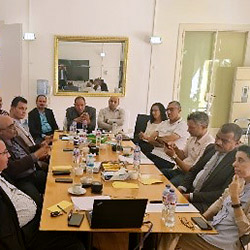 With 2023 being the hottest year on record, it was most timely to launch the Agriculture Innovation Project in Egypt. This initiative aims to foster the adaption and assure the resilience of farmers most affected by climate change. The project got kicked off via an expert meeting including GIZ, ICARDA, the Ministry of Agriculture and Land Reclamation and the Swiss Office for International Cooperation in Egypt.
With 2023 being the hottest year on record, it was most timely to launch the Agriculture Innovation Project in Egypt. This initiative aims to foster the adaption and assure the resilience of farmers most affected by climate change. The project got kicked off via an expert meeting including GIZ, ICARDA, the Ministry of Agriculture and Land Reclamation and the Swiss Office for International Cooperation in Egypt.
 Laila Kenawy
Laila Kenawy
Embassy of Switzerland in Egypt, Office for International Cooperation
LinkedIn | laila.kenawy@eda.admin.ch
Read the full article
Egypt is at risk from climate change that is over-proportionally affecting the poor. Climate change studies suggest that extreme climate events such as heat waves and spread of arid zones will reduce crop productivity by 15% - 50% by 2050, affecting the most vulnerable rural communities and adding to Egypt’s food security risk. Egyptian agriculture is an important economic sector with multi-dimensional challenges. It accounts for 11.7% of GDP, absorbs 25.8% of the working population, and is particularly important for the livelihood of poorer families. Five million smallholders and their families are already suffering from decreased production means, increasing input prices and high inflationary pressures. These combined challenges are exacerbate by limited access to financial services and limited means to deal with the dawning climate change effects, while prices of energy increase and water resources diminish: Egypt faces a classical water, energy, and food nexus challenge. In this context, the “Agriculture Innovation Project (AIP) II”, (implementation 2023-2028) funded by SDC and BMZ and implemented by GIZ, will focus on climate adaptation and poverty alleviation. It aims to improve income and job opportunities of rural communities in Upper Egypt through the promotion of climate smart and green innovation.
The project inception phase kicked off in November 2023 with an expert meeting with representation from the Ministry of Agriculture and Land Reclamation of Egypt, a team of ICARDA, GIZ as well as representatives of the SDC climate and disaster risk reduction and Agriculture Food Systems Networks. The team discussed the assessment methodology, which would recommend the crop and geographical selection, and take gender inclusion and nutrition into account. Finally the experts exchange about possible climate smart agriculture solutions that would be suitable for the Egyptian small holder context. This was just the first of many consultation meetings of the inception of the project.
Agroecological know-how tripled yields in Chad
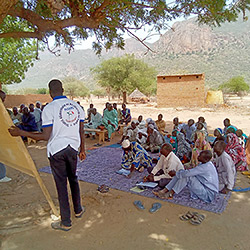 In Guéra, central Chad, climate change and poor land use have made agricultural production uncertain. Nevertheless, the sharing of agroecological know-how has tripled producers' yields, in a region marked by poverty and food insecurity. Learn more about this recently introduced project.
In Guéra, central Chad, climate change and poor land use have made agricultural production uncertain. Nevertheless, the sharing of agroecological know-how has tripled producers' yields, in a region marked by poverty and food insecurity. Learn more about this recently introduced project.
 Sarah Ryser
Sarah Ryser
Unité, Switzerland
s.ryser@unite-ch.org
Read the full article (in french)
Partage de savoir-faire et multiplication des récoltes
La situation humanitaire au Tchad est actuellement caractérisée par une conjonction de quatre crises majeures : les mouvements de populations (notamment liées au conflit soudanais), l’insécurité alimentaire, les urgences sanitaires et les effets du changement climatique. La situation de 2023 est plus préoccupante que celle de 2022, avec 6,9 millions de personnes dans le besoin, dont 4,4 millions de personnes ciblées dans le Plan de réponse humanitaire (HRP) 2023. En 2022, on dénombrait 6,1 millions de personnes dans le besoin parmi lesquelles 3,6 millions étaient ciblées.
La zone couverte par le
Projet de
Sécurité Alimentaire et
Résilience au
Guéra (ProSARG) n’est pas épargnée. Le changement climatique entraîne une baisse de la pluviométrie et l’augmentation des ennemis des cultures qui affectent négativement le rendement céréalier. Les mouvements de populations entraînent la cherté de la vie. Dans une province où 86% de la population vit de l’agriculture de subsistance et où 40% souffre de malnutrition, répondre aux défis de la sécurité alimentaire est urgent.
Le partage du savoir-faire est au cœur du projet ProSARG
Depuis 2017, nos partenaires locaux, les Églises AET, ont établi dans cette zone un réseau qui porte la vision d’une agriculture différente avec la mise en pratique de techniques agroécologiques. L’objectif principal est l’amélioration de la sécurité alimentaire et la capacité de résilience des petits producteurs et des groupes vulnérables.
Tout a débuté par l’organisation de deux jours de sensibilisation animé par un agronome suisse ayant déjà une expérience au Sahel. Parmi les 200 participants, 24 agriculteur.trice.s intéressés ont été sélectionnés pour devenir agriculteur.trice.s promoteur.trice.s. Ils ont été choisis selon leurs compétences agricoles, mais aussi selon leurs aptitudes à partager leur savoir-faire, le projet vise précisément
un effet multiplicateur. Formés aux techniques d’agroécologie et en gestion de petits commerces agricoles, les
agriculteur.trice.s promoteur.trice.s bénéficient d’un suivi et d’un appui bimensuel de trois animateurs dont une animatrice, ainsi que biannuellement d’un ingénieur-agronome béninois lors d’échanges Sud-Sud. Ce dernier facilite notamment la capitalisation des expériences, ce qui est particulièrement apprécié. S’ils étaient 24 au départ, le projet ProSARG recense aujourd’hui 119 agriculteur.trice.s promoteur.trice.s, dont 22 femmes.
A ce jour, le projet ProSARG dispose en outre d’une
ferme de formation et d’expérimentation ainsi que de
trois fermes modèles où les agriculteurs de la zone peuvent venir observer, s’informer, prendre des conseils et partager leurs expériences.
Des techniques simples pour des résultats impressionnants
Une palette de techniques sont enseignées aux
agriculteur.trice.s promoteur.trice.s puis éprouvées sur le terrain et diffusées à d’autres :
- la pratique du zaï (= des creux de 20 à 30 cm de diamètre et 15 à 20 cm de profondeur qui permettent de concentrer l’eau et la fumure dans des micro bassins où les graines sont semées)
- le paillage des cultures pour mieux capter les pluies peu fréquentes et souvent torrentielles, et lutter contre l’érosion
- techniques de diversification des cultures, techniques de compostage
- la pratique de principes éthiques (fidélité à la terre, donner pour recevoir etc.
La plupart de ces méthodes sont simples à appliquer et ont des résultats probants en une saison. Le principe de « prendre et redonner » à la terre est répété. Dieudonné Abakar, agronome et chef du projet ProSARG explique :
«Cela se concrétise dans l’agriculture par le fait que nous devons nourrir nos cultures avec un fertilisant si nous voulons qu’elles nous donnent une bonne récolte. Nous obtiendrons aussi un meilleur rendement si nous sommes disposés à donner de notre temps, de notre énergie et fournir l’effort supplémentaire pour arriver à un niveau d’excellence».
La technique Zaï a fait ses preuves au Sahel, c’est ce que les agriculteur.trice.s constatent aussi au Guéra : le Zaï est une pratique agricole impliquant une gestion de l’eau de ruissellement et de compost provoquant une augmentation visible des rendements et une amélioration de la qualité des sols. Depuis les débuts du projet, la surface de mise en pratique de la technique Zaï a augmenté de 60%, passant de 29, 4 ha en 2021 à 54 ha en 2023. Si l’on admet qu’une famille compte env. 6-8 personne, le nombre de bénéficiaires du projet ProSarg est d’env. 5000 personnes, soit env. 1% de la population du Guéra, région 50% plus grande que la Suisse. Le rendement moyen (t/ha) pour 2022 est de 3,2 contre 2,6 en 2021, sachant qu’avec une méthode traditionnelle, sans la méthode Zaï, le rendement était de seulement 1t/ha, soit 3x moins. Pour une famille cultivant 1 champ d’un hectare cela représente plus de 30 sacs de mil, au lieu de 10 sacs auparavant. Les récoltes avec la méthode Zaï permettent ainsi aux agriculteur.trice.s de répondre aux besoins vitaux de leurs familles. Elles permettent aussi la diversification de la production (avec le surplus, les agriculteurs achètent du bétail, construisent des maisons avec toits en tôles …).
Chaque année, les agriculteur.trice.s qui adhèrent aux techniques agroécologiques sont plus nombreux. De 163 en 2018 ils sont passés à 1110 aujourd’hui. Nous avons recueilli quelques témoignages :
"Mes voisins veulent voir le résultat de ce que je fais avant de commencer. Actuellement, une seule personne dans ma zone a essayé. Au départ, on m’a traité de fou, mais lorsque j’ai commencé à faire des trous de Zaï en saison sèche sur un sol aride très dur et que mes voisins ont vu le développement des plants dans les trous, ils ont compris l’efficacité de cette pratique"
Members' Articles: Focus smallholder farmers
Empowering local farmers in Lebanon for better market resilience
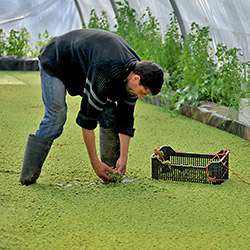
After an agricultural market system analysis, Swisscontact partnered with local NGOs, IZRAA and Arcenciel, to launch an agri-business hub. This initiative includes the Azolla Impact Project, a biodigester, a milk processing unit, and the IZRAA app, all aimed at boosting economic resilience, improving market access, and ensuring sustainability for local farmers.
Eliane Radi
Swisscontact Lebanon
eliane.radi@swisscontact.org
Read the full article
In pursuit of reinforcing the economic resilience of local farmers in Lebanon, Swisscontact has embarked on a transformative journey, closely examining and addressing the challenges within the Lebanese agricultural market. This initiative aims to empower farmers, expand market access, and foster sustainability. Partnering with local NGOs IZRAA and arcenciel, Swisscontact is steering a groundbreaking initiative—the agri-business hub. This initiative includes The Azolla Impact Project, the installation of biodigesters, a milk processing unit, and the IZRAA App.
Azolla Impact Project: A Sustainable Shift in Livestock Feed
A significant hurdle faced by dairy farmers is the cost of importing soybeans for livestock feed, especially after the economic crisis, accounting for a staggering 70% of farm expenditure.
In response, Swisscontact has joined forces with IZRAA, a local NGO working closely with farmers, to introduce the Azolla Impact Project. This innovative initiative encourages farmers to cultivate Azolla, a protein-rich plant that serves as a sustainable alternative to soybeans. The result? A notable 15-20% reduction in total farm costs.
Measuring Impact with Precision
To further enhance the efficiency of the Azolla Impact Project, Swisscontact in Lebanon, in collaboration with arcenciel, has initiated a study. This endeavor seeks to precisely measure the impact of Azolla on milk production and its economic value as a protein source for dairy cows. Based on the findings from these studies, the substitution of soybeans with azolla is progressing gradually, and the outcomes in milk production are consistently positive.
Renewable Energy Solutions
In line with Swisscontact’s commitment to fostering sustainable practices, a pilot project has taken place at a farm in Hemlaya, Mount Lebanon. The primary goal is to empower farmers by reducing their electricity costs and boosting income generation.
The approach involves the installation of a biodigester, designed to harness Methane gas generated from cow manure. This renewable energy source is then utilized to meet the energy needs of farmers, specifically for the storage and processing of milk. The implementation of this biodigester not only contributes to energy self-sufficiency but also plays a crucial role in mitigating greenhouse gas emissions.
A significant positive outcome of this environmentally friendly initiative is the chance it provides for farmers to generate income. By employing the biodigester's digestates as organic fertilizers, farmers can both enhance their crop cultivation practices and sell the fertilizers in the market. This approach contributes to sustainable agriculture while concurrently improving the economic standing of farmers.
Collaborative Milk Processing Facilities
In partnership with Izraa, Swisscontact is actively engaged in the establishment of small-scale milk processing facilities. This collaborative effort is centered on optimizing the conversion of locally sourced milk into higher value-added products, like cheese, which is an important move aimed at transforming the economic landscape for dairy farmers.
The envisioned milk processing unit not only seeks to enhance the value of dairy products but is designed to become an economically sustainable entity. By selling its products and generating income, it will empower dairy farmers, enabling them to sell their products at fair prices, thus creating a more equitable marketplace.
This initiative will reshape the agricultural sector and foster robust economic growth. With plans for implementation on the ground set for the year 2024, Swisscontact and Izraa are laying the foundation for a sustainable future that prioritizes innovation, and economic empowerment.
IZRAA App: Revolutionizing Market Access
Local farmers face hurdles in accessing markets and selling their products at fair prices due to an unorganized sector and lack of transparency with transport services.
Swisscontact has tackled this challenge head-on and implemented it with their partner IZRAA. They have developed a mobile application, the IZRAA app, facilitating direct connections between farmers and end consumers. This innovative solution empowers farmers with easier market access, enabling them to sell their products at more reasonable prices, benefiting both producers and consumers. So far, we have 257 farmers registered to use the app while it’s being developed and tested.
Anticipating Positive Changes on Farmers’ lives
The project is set to enhance the farmer’s quality of life in Lebanon. Here is the anticipated impact:
- Cost reduction: Farmers can cut down their animal food costs by up to 30% with local azolla. Which would enhance their financial situation and support sustainable farming.
- Green Energy: The project brings in biodigesters for farmers. These give a green and sustainable energy source, reducing the need for expensive imported energy. Which is good for both farmers and the environment.
- Better Products, More Jobs: New milk processing facilities mean farmers can turn basic products into valuable ones. This not only gives them a steady income but also creates jobs in rural areas, helping communities grow.
- Direct Selling: With digital tools and regional dispatch centers, farmers can now sell directly to consumers. This skips the intermediaries, letting farmers sell more and earn more.
As these changes roll out, the project sees a future where local farmers do well, and farming in Lebanon becomes stronger and more prosperous.
Regional Impact and Future Prospects
These interventions are not confined to local boundaries; they are poised to create a ripple effect at a regional level, especially in the Middle East. The aim is to establish a larger market that supports and empowers farmers, leading to an improved quality of life and contributing to overall economic growth.
In conclusion, this initiative signifies a significant stride toward creating a resilient and sustainable future for local farmers in Lebanon. With the unwavering support of donors and the dedication of our partners, Swisscontact is charting a path toward a thriving agricultural landscape that benefits both farmers and consumers alike.
This project is financed by the Leopold Bachmann Foundation, among other donors. This project is part of the Swisscontact Development Programme, which is co-financed by the Swiss Agency for Development and Cooperation (SDC), Federal Department of Foreign Affairs FDFA.
Who secures Zimbabwe’s seed: local or informal systems?
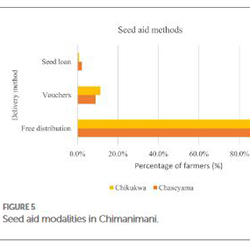
Efforts to enhance smallholder farmers’ seed security don’t always succeed. Governments, donors, and other actors have neglected local seed systems as they are assumed to be incapable of addressing farmers’ seed challenges. Instead, they rely on seed aid and formal seed provisioning outlets like agro-input dealers. This paper shows the superiority of local seed systems in ensuring greater access to quality, affordable and timely seed compared to formal sources.
Members' Articles: Focus organic farming
Call for participation: survey on the new EU organic regulation
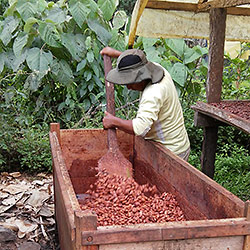
The new EU organic regulation N° 2018/848 re-defines the rules for international organic production destined for the EU market. FIBL invites producer groups and companies exporting organic products to Europe, as well as organic traders in the EU and other stakeholders to participate in an international survey to collect data for a study on the implications of the new rules on smallholder supply chains. Learn more and take part in the survey!
Read the full article
The new EU organic Regulation N° 2018/848 brings significant changes for all organic operations in Third countries wishing to export organic products to the EU from 2025 onwards, but in particular for smallholder producer groups in developing and emerging countries.
The EU Import system changes from an “equivalence” based system to “compliance” with all detailed EU rules. The new regulation is already in force within the EU, but operations in most third countries will be controlled for the first time in the course of 2024, according to their organic certifier’s schedules. Only certificates in compliance with the new Regulation 2018/848 will be accepted for organic imports into the EU (and Switzerland) from most third countries from 1.1.2025 onwards.
The regulation defines new rules for certification of smallholder farmers as a “group of operators”. This has direct consequences for all farmer groups organized by export/processing companies, but also for many farmers associations, who may need to set up new farmer group legal entities or adapt their certification set-up to meet the new group certification requirements for the EU market.
The
Swiss Research Institute of Organic Agriculture (FiBL) is conducting a study on the impacts of the new EU organic regulation on smallholder supply chains from developing and emerging countries and its expected effects on the EU and Swiss organic market. The study is conducted with financial support from the Swiss State Secretariat for Economic Affairs (
SECO).
The online survey for representatives or managers of producer groups and traders in Third countries can also be accessed here in
English,
Español,
Français.
Make your voice heard by taking the time to share information about your organization’s situation, the challenges and opportunities you foresee and the impacts you expect on your operations and business. Even if you are not aware of the upcoming changes yet, you can still provide valuable information and feedback and learn more about what’s coming. Thanks so much for your cooperation.
Further resources:
Link to survey
Learn more
Launch of Ecological Organic Agriculture Strategy in Tanzania
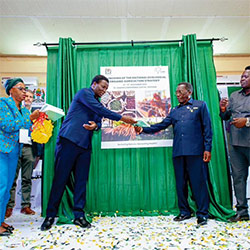
Tanzania launched the National Ecological Organic Agriculture Strategy 2023/2030 (NEOAS) in November 2023. SWISSAID initiated and co-supported its development process, which started in 2021 by Tanzania Organic Agriculture Movement (TOAM). NEOAS aims at accelerating development and mainstreaming of the ecological organic agriculture subsector into existing national agricultural frameworks.
 Gladness Brush
Gladness Brush
Swissaid Tanzania
LinkedIn | g.brush@swissaidtanzania.org
First consumer cooperative founded in North Macedonia
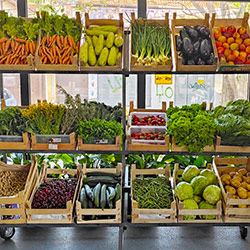
Good Earth is the first consumer cooperative in North Macedonia. Their work is founded upon the idea of “environmentally and socially sustainable systems for local food sovereignty”. As such, they are strongly concerned with successfully raising awareness about the unreasonable use of natural resources in food production and the resulting pollution. The organic cooperative is committed to sustainable food production in a reciprocal relationship with natural resources instead of their exploitation.
 Ema Jakimovska
Ema Jakimovska
Swiss Increasing Market Employability Programme
LinkedIn | ema.jakimovska@thepalladiumgroup.com
Read the full article
Food Coop ‘Good Earth’ - Altering the Existing System of Production, Distribution, and Consumption Habits of Local Food in North Macedonia
Weak interaction among key actors in organic agriculture remains one of the most critical obstacles for improved cooperation at all levels in the value chain. One of the biggest challenges in development of organic production is that farmers do not perceive this as a sector with a guaranteed income due to the lack of regular consumers. The food market is dominated by large distributors and market chains that dictate the rules regarding prices and quantities of products. In 2014, there were local fresh fruit and vegetable markets in Skopje, but organic products in these markets were sporadically available with poorly planned deliveries.
Good Earth is the first consumer cooperative in North Macedonia. Their work is founded upon the idea of “environmentally and socially sustainable systems for local food sovereignty”. As such, they are strongly concerned with successfully raising awareness about the unreasonable use of natural resources in food production and the resulting pollution. The organic cooperative is committed to organic and chemically untreated food produced in a sustainable way and in a reciprocal relationship with natural resources instead of their exploitation. This is essential for ensuring the sustainability of our food systems and safeguarding the environment for future generations, through adopting sustainable agricultural practices, resource-efficient technologies, and responsible consumption habits.
According to them no compromises should be made between food sovereignty (understood as a healthy local production of food), personal health, and the health of the community. Through the Swiss funded project ‘Increasing Market Employability Programme (IME), Good Earth adopted the business operations model of a consumer cooperative back in 2014, which proved successful in increasing their sales and membership base – while at the same time “jumpstarting” organic food production in the country. With Switzerland’s support, they further invested in a cooling facility, which helped the purchase of quantities from farmers, store larger quantities of food for longer periods, streamline the products’ distribution process, and extend the products’ shelf life.
A thriving business model for organic food production in North Macedonia
The adopted business model of a cooperative helps solving many problems in production and the supply of organic food. Good Earth is organised horizontally, being transparent and socially oriented, setting an alternative to the existing system of production, distribution, and consumption of local food. The creation of the cooperative enables to demystify the certification process, which many of the organic food producers think is too costly and demanding and get support to meet requirements for organic certification from the cooperative. Now - farmers themselves are initiating meetings and want to be part of Good Earth.
The cooperative is currently working with more than 130 members and over 50 farmers in different parts of the country, while some of them are already certified organic producers. Their goal is to also work with farmers who do not use chemicals and artificial fertilizers and gradually convert them to certified organic production, through recommendations and transfer of knowledge. This resulted in food producers such as a group of beekeepers from the Bregalnica region cultivating the Macedonica breed of bees, which is endemic to the region, and producers of Peruvian strawberries in the vicinity of Skopje joining the cooperative as suppliers for the first time
The cooperative business model proved successful in enabling producers of organic food to thrive and regularly sell their produce. Last year they managed to make contracts with producers with the goal to plan the quantities in advance and guarantee the purchase. The total value of purchases from individual suppliers marked growth of almost 40% in the last year. Good Earth has become a symbol for quality and trust, among local farmers in North Macedonia.
Good Earth’s approach and core principles
In their everyday work, the cooperative is concerned with executing and caring for the following items.
1.
Food sovereignty - the model enables creating healthy local communities based on interconnectedness and trust through nature protection
- Domestic food system should be based on local producers
- Direct relation of local consumers with producers
- shortening the supply chain, reducing pollution, enhancing trust, social cohesion
2.
Public gardens and compost
- Increasing the public awareness for gardening and local food production (with the lowest environmental footprint)
- Composting of all bio-waste
3.
Recycling, reuse of materials
- Reduce waste when delivering products
- Reduction of pollution caused by transport of products
The cooperative model has been established with the objective of raising awareness about the importance of food safety and for bringing people (consumers) closer to organic and locally produced food. Furthermore, a cooperative can directly inform consumers’ action when they want to switch to consuming local and organic food, and the acceptance of this trend is growing into a people’s habit in the country. Decisions of the cooperative are done collectively and transparently, all supporting the idea for which they initially have been formed, which is that more people in North Macedonia consume local organically produced food, and more distribution channels for organic products to be successfully created in the country.
Food safety and regular distribution in a sustainable manner
Small organic producers rarely sell products directly to consumers, as it is an additional obligation besides production for which they often lack skills and time. They organise the selling process of organic products from North Macedonia through an organic weekly shopping basket for members. Consumers who are not members can buy the products at a store based in Skopje. Members are obliged to pick up their basket created by the cooperative once a week. The organic weekly basket is a carefully picked set of around ten fresh local seasonal fruits and vegetables. The basket is a vivid embodiment of Good Earth’s core values - planned production and reduction of food waste that directly affects the environmental footprint. Food waste here is reduced to a minimum of 5 %, whereas usually almost 30% of fruits and vegetables from small organic farmers end up as garbage.
With the obtained cooling capacity, Good Earth can buy more products, extending their shelf life. This also results in a safe purchase, fair and adequate prices that consider the hard work of every small producer involved in the process. This also enables increasing their offer and purchasing larger quantities of organic produce from local farmers. “Establishing a cooling facility was a level up for the Coop and with a clear positive effect on our work and the collaboration with the local organic producers. We are thankful for the strategic support we received through the Swiss Increasing Market Employability Programme – IME.” – observes co-founder Ivona Baru.
The cooperative promotes balance between the demands of both consumers and producers, being not customer centric. It supports small, local organic producers of chemically untreated food, as they do not destroy nature and biodiversity. On the other hand, consumers change their eating habits by organic food becoming available and affordable to everyone. Promoting food security with a focus on organic and nutritious food can help ensure that people have access to healthier and more sustainable options. Namely, Good Earth ensures a reliable access to safe food and lower prices for its members. As organic food becomes more accessible and competitively priced, more people are likely to try and include these products in their shopping choices. With consumers having easier access to these healthier options, they choose organic fruits, vegetables, grains, and other products over food containing high levels of sugar and genetically modified organisms (GMO).
“I have been a member of the cooperative for seven years. The biggest advantage is that it has enabled me to consume organic seasonal vegetables and fruits without any pesticides, which are typical for our geographical region and grown by local farmers. In ten years from now, I think people will finally realise the importance of consuming locally produced food and local products.” – says Novica Sotarovski, a member of Good Earth since 2015.
Consumer retention and resilient cooperative business model
The cooperative helps producers get a direct access to consumers, access the market, and sell their products. Good Earth marks a steady growth of members, indicating a 50% increase since the founding of the cooperative. As of today, the cooperative counts 150 members, out of which 128 are women and 18 are young people under the age of 29. The established organic basket system represents a fine balance between the needs of producers and those of the consumer community. What is most authentic in the entire approach is that the cooperative enables consumers to establish a direct contact with producers, giving them a rare opportunity to know each producer and be certain that food is produced in an organic manner. “Couple of times per year we organize a visit to one of our producers. These meetings establish a relationship of trust between the members and the producers which is crucial in organic production.” – says co-founder Ivona Baru.
The support for promotion received from the Swiss Increasing Market Employability Programme – IME was crucial for rising brand awareness Food Coop ‘Good Earth’ - Altering the Existing System of Production, Distribution, and Consumption Habits of Local Food in North Macedonia
Weak interaction among key actors in organic agriculture remains one of the most critical obstacles for improved cooperation at all levels in the value chain. One of the biggest challenges in development of organic production is that farmers do not perceive this as a sector with a guaranteed income due to the lack of regular consumers. The food market is dominated by large distributors and market chains that dictate the rules regarding prices and quantities of products. In 2014, there were local fresh fruit and vegetable markets in Skopje, but organic products in these markets were sporadically available with poorly planned deliveries.
Good Earth is the first consumer cooperative in North Macedonia. Their work is founded upon the idea of “environmentally and socially sustainable systems for local food sovereignty”. As such, they are strongly concerned with successfully raising awareness about the unreasonable use of natural resources in food production and the resulting pollution. The organic cooperative is committed to organic and chemically untreated food produced in a sustainable way and in a reciprocal relationship with natural resources instead of their exploitation. This is essential for ensuring the sustainability of our food systems and safeguarding the environment for future generations, through adopting sustainable agricultural practices, resource-efficient technologies, and responsible consumption habits.
News
New monitoring mechanism to uphold peasants’ rights
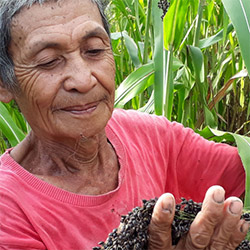
A milestone in peasants’ rights has been reached with the recent adoption of a new special procedure to monitor the UN Declaration on the rights of peasants and other people working in rural areas (UNDROP) by the Human Rights Council. The partners of the RAISE project on Human Rights in Food Systems, which is co-financed by SDC, were actively lobbying for the creation of this international monitoring mechanism on the rights of peasants and appreciate this significant step.
Christa Suter
Fastenaktion, Switzerland
suter@fastenaktion.ch
Read the full article
The RAISE project stands for Rights-based and Agroecological Initiatives for Sustainability and Equity in Peasant Communities and is led by Fastenaktion. The partners in the international RAISE consortium are VSF-Suisse, the Rural Women’s Assembly, DKA Austria and the local peasant organisations. RAISE activities support the implementation of UNDROP, and especially the right to food, the right to land, the right to seed, and the right to participate in decision-making. The activities take place in seven focus countries in Africa and Asia (South Africa, Kenya, Burkina Faso, Niger, Mali, India, and Nepal). The strategic partner of the RAISE project is the Geneva Academy.
In the process leading up to the adoption of the UNDROP resolution to create a new special procedure, the RAISE partners have been engaged in discussions and side-events, voicing the importance of a monitoring mechanism on peasants’ rights.
While the UN Declaration on the rights of peasants and other people working in rural areas (UNDROP) was adopted by the UN General Assembly already in 2018, this new monitoring mechanism will address its implementation. The working group will be responsible for the promotion of the UNDROP and will identify best practices and lessons learned, foster collaboration and undertake country visits, to alert on violations of the rights of peasants and other people working in rural areas.
The creation of this international mechanism marks a significant step forward in addressing an issue that is of paramount importance for peasants: peasants and their organizations now have a platform to shed light on the violations they face and draw attention to the numerous obstacles they confront in the pursuit of their rights.
This mechanism represents therefore a pivotal political and legal tool for advancing the realization of the rights enshrined in UNDROP.
The creation of this working group also demonstrates the growing international recognition of the important role that family farming plays in food production, preserving biodiversity and protecting the environment. During the whole negotiations, peasants’ organizations played a crucial role in this breakthrough, supported by RAISE project partners.
The Working Group will be made up of five independent experts from different continents and will be operational in Spring 2024.
RAISE will work closely with this new mechanism to ensure its success and will also continue to closely monitor the situation of peasants' rights around the world. The RAISE partners are implementing activities to empower peasants to know their rights and to develop strategies to claim them, to sensitize duty bearers on the rights of peasants and how to bring forward their implementation, to strengthen global frameworks on peasants’ rights through influencing UN mechanisms, and to create global awareness to further advance peasant rights.
Africa needs stronger competition to end hunger
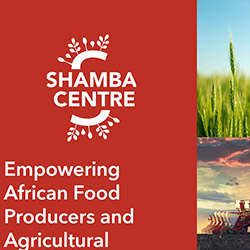
The extreme concentration of food and agricultural market is an overlooked force driving up food insecurity and poverty in Africa. Competition laws and policies need urgent reform to empower small agricultural businesses and farmers and enable a transition towards more inclusive and sustainable agri-food systems. Read more about their significance for small agricultural businesses in the recently published report of Shamba Centre.
Read more
 Myriam Hammadi
Myriam Hammadi
Shamba Centre, Rwanda
LinkedIn
| myriam@shambacentre.org
Education as a basis for Nigeria’s future harvest
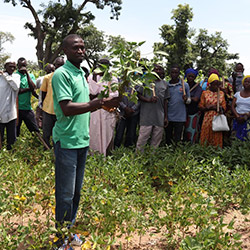 Nigeria is by far the most populous country in Africa. Around 225 million people live in the West African state and the population is constantly growing. However, poverty is high and Nigeria's agriculture is under pressure, partly due to global warming. With its 2023 campaign, Mission 21 is focusing on the importance of education for ecologically sustainable development in Nigeria - and also in Switzerland. Watch the video to learn more about the role of education in Nigeria’s future harvest (Article / Video only in German).
Nigeria is by far the most populous country in Africa. Around 225 million people live in the West African state and the population is constantly growing. However, poverty is high and Nigeria's agriculture is under pressure, partly due to global warming. With its 2023 campaign, Mission 21 is focusing on the importance of education for ecologically sustainable development in Nigeria - and also in Switzerland. Watch the video to learn more about the role of education in Nigeria’s future harvest (Article / Video only in German).
 Sarah Ryser
Sarah Ryser
Unité Switzerland
s.ryser@unite-ch.org
Read the full article (in german)
Die landwirtschaftlich nutzbare Fläche pro Kopf in Nigeria wird im Vergleich zur wachsenden Bevölkerung immer kleiner. Rund 40 Prozent der Nigerianer*innen leben unterhalb der Armutsgrenze und sind auf den eigenen Anbau angewiesen. Die konventionellen Anbaumethoden mit synthetischem Dünger laugen viele Böden aus, die Bodenfruchtbarkeit nimmt ab.
Schwierig entwickelt sich die Situation im Nordosten des Landes, wo mehrheitlich Mais, Reis, Hirse und Erdnüsse angebaut werden. Hier wirkt sich die weltweite Klimaerwärmung immer nachteiliger aus. Die jährlichen Trockenzeiten werden länger, die Regenzeiten kürzer und meteorologische Extremereignisse nehmen zu. Allein 2022 starben rund 600 Nigerianer*innen dieser Region wegen Überschwemmungen.
Abholzungen und Erosion, Umweltverschmutzung durch Abfall und verseuchtes Grundwasser verschlechtern die Bodenqualität zusätzlich. Die Versorgung der lokalen Bevölkerung, mehrheitlich Bäuerinnen und Bauern, ist gefährdet. Und Hilfe durch den Staat fehlt, die Region wird vernachlässigt. Immer wieder verüben auch Milizen wie Boko Haram oder der «Islamische Staat» sowie kriminelle Banden Anschläge und Entführungen. Zahlreiche Felder liegen brach, denn viele Menschen flohen vor dem Terror und wagen noch nicht, auf ihr Land zurückzukehren.
Bildung für Bäuerinnen und Bauern
Mission 21 unterstützt zwei Organisationen, die in sicheren Gegenden die Bevölkerung mit Bildung stärkt: Die Partnerorganisation «Association for the Promotion of Natural Medicine and Resources» (AsProNMeR) unterstützt Bauernfamilien beim Bau von energiesparenden Holzöfen. Und die Kirche der Geschwister (EYN), langjährige Partnerkirche von Mission 21, bildet mit ihrer Fachstelle «Integrated Community-Based Development Programme» (ICBDP) Landwirt*innen in nachhaltiger, umweltfreundlicher Landwirtschaft weiter.
Im Nordosten, wo das Vertrauen zwischen Muslim*innen und Christ*innen massiv gestört ist, ist die Arbeit der ICBDP besonders wichtig: Als kirchliche Fachstelle arbeitet sie mit Menschen verschiedener Glaubensrichtungen und ethnischer Hintergründe in ländlichen Gemeinden. Die Arbeit der ICBDP stärkt die Resilienz der Bevölkerung. Sie mobilisiert die Menschen, gemeinsame Probleme durch Selbsthilfeinitiativen anzugehen, sensibilisiert lokale Gemeinschaften für die Problematik der Klimaerwärmung und fördert agrarökologische Anbaumethoden.
Mischkulturen und Wiederaufforstung
Bäuerinnen und Bauern lernen zum Beispiel die Vorteile der Mischkulturtechnik kennen und wie sie verschiedene Pflanzen zusammen anbauen, den Boden dadurch besser schützen und
Die landwirtschaftlich nutzbare Fläche pro Kopf in Nigeria wird im Vergleich zur wachsenden Bevölkerung immer kleiner. Rund 40 Prozent der Nigerianer*innen leben unterhalb der Armutsgrenze und sind auf den eigenen Anbau angewiesen. Die konventionellen Anbaumethoden mit synthetischem Dünger laugen viele Böden aus, die Bodenfruchtbarkeit nimmt ab.
Mischkulturen und Wiederaufforstung
Bäuerinnen und Bauern lernen zum Beispiel die Vorteile der Mischkulturtechnik kennen und wie sie verschiedene Pflanzen zusammen anbauen, den Boden dadurch besser schützen und nachhaltiger nutzen. Sie verwenden Tierdung als Dünger und erlernen umweltfreundliche Methoden zur Bekämpfung von Schädlingen.
Um der Bevölkerung dieses Wissen gut zu vermitteln, schickt die ICBDP ihre Fachleute und Berater*innen zur Beratung in die Dörfer und hat im Jahr 2022 auch den jährlichen «Farmer’s Field Day» ins Leben gerufen. So können sich die Dorfbewohner*innen gemeinsam informieren, austauschen und offene Fragen diskutieren.
Holzsparende Kochöfen
Die Vereinigung AsProNMeR fördert energieeffiziente Holzöfen in den Gemeinden und organisiert Workshops. Darin wird über die schädlichen Folgen der Abholzung und die Auswirkungen des Klimawandels informiert, und die Teilnehmenden erhalten praktische Bauanleitungen für die Öfen und Förderung für den Bau. Die geschlossenen Kochöfen bieten vor allem den für die Hausarbeit zuständigen Frauen grosse Vorteile. Die Öfen benötigen zwei Drittel weniger Holz, die Frauen dadurch weniger Zeit fürs Sammeln und sie sind besser vor gesundheitsschädlichem Rauch geschützt.
Die Förderung der nachhaltigen Landwirtschaft und Nutzung der Ressourcen im Nordosten Nigerias trägt bereits Früchte. Die Beratungen und der erste Farmer’s Field Day wurden von den Teilnehmenden sehr gut aufgenommen. Zahlreiche Teilnehmende wünschen regelmässige weiterführende Informationen. Die energieeffizienten Kochöfen gewinnen ebenfalls an Beliebtheit. Immer mehr Familien und besonders Frauen entscheiden sich dafür.
Dazulernen für eine nachhaltige Entwicklung in der Schweiz
Auch in der Schweiz ist im Sinne der Klimagerechtigkeit eine umweltfreundliche und ressourcenschonende Lebensweise wichtig. Mission 21 zeigt mit ihren Bildungsangeboten und Aktionsideen Möglichkeiten dazu auf. Angeboten werden Informationen zu saisongerechter Ernährung und zur Bedeutung von Bio-Gemüse. Auf der Website sind Filmtipps zu finden, die informieren und ermutigen. Und verschiedene Veranstaltungen eröffnen motivierende und auch poetische Zugänge für Schritte in eine nachhaltige Zukunft. So soll die Kampagne 2023 dazu beitragen, dass möglichst viele Menschen mithelfen, ein Leben in Würde für alle Menschen zu fördern.
Past Events
Shining a light for biodiversity - four perspectives to the life that sustains us
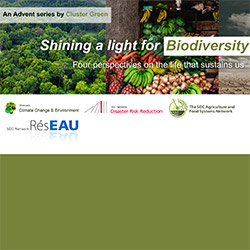 Switzerland and online | December 2023
Switzerland and online | December 2023
SDC's Cluster Green
(Food Systems, Climate Change, Water) has been organising a Biodiversity Advent series. This end-of-year cycle of hybrid events has celebrated the diversity of nature’s living resources for people and the planet. In four different sessions guest speakers introduced participants to the importance of biodiversity presenting their area of expertise within the thematic areas of the Cluster Green. The session slides are available for download.
Read more
Closing the micronutrient gap in secondary cities
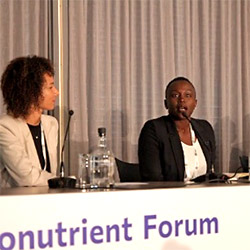 Netherlands | 16-20 October 2023
Netherlands | 16-20 October 2023
The Micronutrient Forum’s 6th Global Conference took place online and at The Hague, Netherlands, October 16-20th 2023, with a thematic focus on “Nutrition for Resilience”. The conference provided opportunities to advance integrated research, set new policy and investment priorities and to accelerate progress towards global nutrition and development goals. The Nutrition in City Ecosystems (NICE) project hosted a session entitled “Interventions to Close the Micronutrient Gap in Secondary Cities”.
Read more
Savings and credits for family farming in sub-Saharan Africa
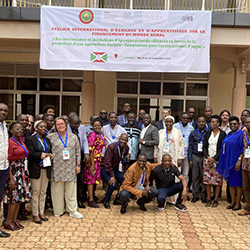 Burundi | September 2023
Burundi | September 2023
Learn more about the conclusions and recommendations from the international workshop on rural financing held in Gitega, Burundi, in September 2023, organised by the Burundian association ADISCO with the support of Philea, IRED and the Plateforme souveraineté alimentaire of member organizations of the Fédération genevoise de cooperation (Article only in French).
Read the full article (in French)
Un atelier international s’est tenu sur le thème du financement du monde rural à Gitega au Burundi en septembre 2023, organisé par l’association burundaise ADISCO avec l’appui de Philea, IRED et la Plateforme souveraineté alimentaire d’organisations membres de la Fédération genevoise de coopération.
Une quarantaine de participant·e·s engagé·e·s dans la promotion de l’épargne et du crédit en milieu rural issus de 8 pays d’Afrique de l’Est et de l’Ouest ont échangé leurs approches et méthodes et débattus des moyens d’améliorer leurs actions.
Trois principaux axes de développements futurs
-
Des moyens de renforcer les pratiques d’épargne dans les villages et les groupements afin de constituer des capacités d’investissement, avec l’appui d’une éducation financière;
-
Des coopérations possibles et souhaitables entre les institutions financières (banques, de microfinance (IMF) etc…) majoritairement urbaines, et les organismes d’appui au développement rural au bénéfice des groupements villageois et de leurs capacités d’emprunts et d’investissements;
-
Des voies pour réformer la gouvernance des coopératives d’épargne et de crédit bien implantées en milieu rural mais peu aptes à recycler l’épargne rurale en crédit pour les paysans et les paysannes.
Les ménages ruraux n’ont pas accès au crédit en Afrique sub-saharienne
Le point de départ de ces réflexions est la rareté du crédit en milieu rural. Au mieux environ 5% des ménages ruraux en Afrique sub-saharienne ont accès à un crédit. Selon la Banque mondiale dans une étude de 2008 1 « Les contraintes financières continuent d’être un problème généralisé dans l’agriculture ; elles sont coûteuses, touchent les différents groupes de population de manière inéquitable et réduisent gravement l’aptitude des petits agriculteurs à soutenir la concurrence.» Ce constat est partagé par SOS Faim dans une publication de 2013 consacrée à la finance rurale.2 De même pour une publication d’Inter-réseaux de 2016.3
Ces constats sont aussi ceux d’une étude sur l’inclusion financière de la Banque de la République du Burundi de 2012 qui note:
« 12,5 % de la population adulte possèdent un compte dans une institution financière, ce qui signifie qu’environ 480 000 personnes participent aujourd’hui au système financier formel; à l’inverse, environ 3,3 millions de personnes en sont exclues …. Le taux de possession d’un compte est cinq fois plus élevé en zones urbaines qu’en zones rurales; le taux ne dépasse pas 5 % dans (plusieurs) provinces … Les garanties exigées tant par
les banques que par les IMF ont pour effet de limiter l’accès au crédit pour une grande majorité de la population qui n’est pas salariée. »
D’un côté un accès très restreint des ruraux au crédit, de l’autre de nombreuses expériences innovantes, porteuses de solutions, mais à ce stade à une échelle « micro ». La révolution du micro-crédit en Afrique sub-saharienne n’est pas encore avenue, elle est attendue.5 Les échanges de Gitega aspirent à accélérer cette évolution.
Comment renforcer l’épargne des groupements villageois ?
Les pratiques d’épargne et de crédit villageoises ou systèmes tontiniers en Afrique Sub-saharienne sont légions et relativement bien documentés.6 Les organismes d’appui présents à Gitega ont une grande expérience de l’appui aux tontines villageoises par lesquelles des groupements de 10-30 personnes collectent une épargne hebdomadaire ou mensuelle et la reverse à chaque membre à tour de rôle. L’épargne est modeste mais régulière. Elle permet de petits achats en intrants, en transport, en animaux d’élevage.
Les modalités plus abouties constituent différentes caisses dont celles à finalité solidaire et collective pour mieux gérer les dépenses liées au décès, à la santé, aux contingences agricoles et autres calamités possibles.
Pour toutes il s’agit de « garder l’argent au village » plutôt que de le voir partir en ville. Surtout les groupes d’épargne, dans lesquels la participation des femmes est souvent majoritaire, renforcent les capacités à gérer ensemble des ressources financières dans la transparence. Des appuis en éducation financière, avec des modules et une pédagogie adaptés à des personnes faiblement alphabétisées, ont fait leurs preuves. La coopérative Philea a développé en collaboration avec IRAD des modules adaptés.
Les échanges de Gitega ont porté sur les critères à même de caractériser une solide gestion, une gouvernance démocratique et des modalités d’épargne à finalités diverses. Ces critères gagneraient à être davantage formalisés. L’approche privilégiée est celle d’une pratique d’épargne d’au moins 12 mois avant un emprunt qui ne devrait excéder un tiers de la capacité de remboursement.
Une succession de petits crédits, alimentés par l’épargne des communautés, permet une accumulation de capital au niveau des groupements et des ménages ruraux. Au Burundi l’association ADIP expérimente une méthode de crédit calculée en fonction de l’épargne individuelle et collective afin de tripler les investissements et sortir les ménages de la pauvreté qu’elle appelle le matching.
Les dangers liés à l’argent dit « froid », venant de l’extérieur du village par opposition à celui dit « chaud » issu de l’épargne du groupement villageois ont été rappelés. Des règles claires et bien
comprises ainsi qu’une éducation financière complète doivent permettre de surmonter ces perceptions dichotomiques et dommageables.
L’épargne villageoise porte sur des montants modestes, à l’échelle des revenus monétaires très bas des ménages ruraux pauvres. Lorsque des investissements plus conséquents sont envisagés avec des emprunts plus importants des modalités différentes s’imposent. Mais attention au surendettement, souvent reproché au micro-crédit.
En lien avec ces questions de méthodes d’appui se pose celle de la massification des actions engagées qui restent majoritairement aujourd’hui à une échelle micro. Comment passer d’une échelle de quelques centaines voire dizaines de milliers de bénéficiaires à plusieurs millions ?
Renforcer les coopérations entre les institutions de microfinance, les organismes d’appui et les groupements villageois
Les institutions de microfinance ont apporté beaucoup d’inclusion financière que les établissements bancaires établis ne pouvaient offrir. Cependant ces IMF sont essentiellement urbaines, bien que le Professeur Yunus, fondateur de la banque Grameen du Bangladesh ait centré son action en milieu rural. Les coûts de transaction sont plus faibles en milieu urbain que dans les régions rurales où les risques sont aussi plus élevés. Les organismes d’appui ont l’expérience de nombreuses années de travail aux côtés des populations rurales démunies. Mais elles manquent de savoir-faire en matière de gestion de crédits.
Lorsque des organismes d’appui gèrent des fonds de roulement ou de garantie intégrés à des projets de coopération des questions de pérennité se posent. Qu’advient-il au terme du projet ? Une certaine confusion s’introduit entre l’aide apportée aux villages et les règles de remboursement d’un emprunt.
Les deux institutions ont objectivement un intérêt à coopérer. Pour cela il faut faciliter les communications, apprendre à se parler et se comprendre mutuellement et développer les coopérations. C’est l’intérêt de la rencontre de Gitega d’avoir permis ce dialogue.
Les IMF peuvent octroyer des crédits plus importants à des groupements villageois ou coopératives souhaitant investir dans des équipements et infrastructures à usage collectif. Les IMF peuvent recourir à des garanties partielles offertes par des mécanismes bien rôdées. L’expérience de Philea, auparavant Fonds international de garantie (FIG) en atteste. 8 Avec l’appui de Philea plusieurs IMF du Burundi ont décidé en 2023 de coopérer pour une offre de crédit aux équipements en milieu rural.
Au Togo le GRADSE gère des crédits au bénéfice des populations rurales et parvient à conjuguer une gestion financière rigoureuse avec un suivi régulier et approfondi des bénéficiaires.
Plusieurs organismes d’appui à l’instar de l’Union pour la coopération et le développement (UCODE) du Burundi ont acté une séparation institutionnelle entre une coopérative de membres, un organisme d’appui et une microfinance dédiée au service des membres de la coopérative mais
institutionnellement distincte. UCODE travaille principalement en appui à des groupements agropastoraux.
Une question importante et non résolue porte sur le financement des coûts associés au suivi des remboursements. Les IMF ne souhaitent pas assumer ces charges; les groupements eux-mêmes ne le peuvent guère; les organismes d’appui peuvent le faire mais sont dépendants des financements internationaux des projets mis en oeuvre. Des formules innovantes sont à inventer.
Comment réformer la gouvernance des coopératives d’épargne et de crédit afin de mieux défendre les intérêts des petites exploitations familiales
Dans plusieurs pays en Afrique des coopératives d’épargne et de crédit sont bien implantées en milieu rural. Celles-ci sont présentes dans la plupart des pays de la région.
Ces établissements mobilisent une épargne rurale conséquente mais ont tendance à recycler ces capitaux en milieu urbain, essentiellement pour des opérations immobilières. Mais à qui appartient l’épargne collectée par ces institutions ? La question a été posée à Gitega. Les réponses avancées portent sur la réforme de la gouvernance de ces institutions, une meilleure représentation des populations dans les organes de décision, et une participation des organisations paysannes dans les conseils d’administration. Une formation spécifique au rôle d’administrateur serait souhaitable.
Au Sénégal les organisations paysannes ont fait campagne pendant de nombreuses années pour conquérir une représentation conséquente au sein de la Caisse nationale de crédit agricole.
De telles réformes semblent nécessaires afin de permettre aux coopératives d’épargne et de crédit de jouer pleinement leur rôle de financement de l’agriculture et du monde rural. Voilà un agenda de plaidoyer pour les organismes d’appui en coopération avec les organisations paysannes bien articulé à Gitega.
Conclusions
Les exploitations familiales sont à la base de l’agriculture vivrière et de rente en Afrique sub-saharienne. Le crédit constitue un vecteur indispensable pour éliminer la pauvreté et assurer l’essor de l’agriculture paysanne. A cet égard les expériences des organismes d’appui et des tontines villageoises sont précieuses car pleines d’enseignements, mais celles-ci restent trop souvent à petite échelle. Plusieurs institutions misent sur la technologie, les banques et les transferts numériques pour essaimer plus largement. Si les nouvelles technologies peuvent aider elles ne peuvent s’atteler à ce qui relève des politiques publiques et de l’engagement de l’Etat en soutien à l’agriculture familiale et la souveraineté alimentaire. Le plaidoyer des organisations d’appui est plus que jamais nécessaire. Ce message a été clairement énoncé à Gitega. Des actions de suivi sont prévues dans les différents pays dont sont issus les participant·e·s et leurs organismes d’appui.
Publications
Food, nutrition, and the right to health – a recent UN report
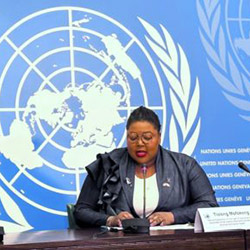 In the present report, the UN Special Rapporteur on the right of everyone to the enjoyment of the highest attainable standard of physical and mental health, Tlaleng Mofokeng, focuses on food, nutrition, and the right to health. She analyses access to food and nutrition and related clinical and health outcomes, and their reflection of power asymmetries, policy and regulatory frameworks.
In the present report, the UN Special Rapporteur on the right of everyone to the enjoyment of the highest attainable standard of physical and mental health, Tlaleng Mofokeng, focuses on food, nutrition, and the right to health. She analyses access to food and nutrition and related clinical and health outcomes, and their reflection of power asymmetries, policy and regulatory frameworks.
Read more
New publication "Agrobiodiversity on the plate" focuses on NUS and millets
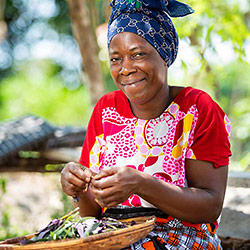 A recent publication by
CROPS4HD highlights the great benefits of neglected and underutilized crops (NUS) for human nutrition and as a response to climate change. In view of the International Year of Millets 2023 two NUS millet species, namely fonio and finger millet are presented in more detail with delicious recipes. In addition to their high nutritional value, local species and varieties are often well adapted to local conditions.
A recent publication by
CROPS4HD highlights the great benefits of neglected and underutilized crops (NUS) for human nutrition and as a response to climate change. In view of the International Year of Millets 2023 two NUS millet species, namely fonio and finger millet are presented in more detail with delicious recipes. In addition to their high nutritional value, local species and varieties are often well adapted to local conditions.
Read more
Final Report Food Systems Learning Journey
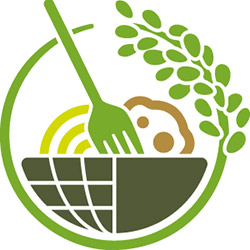 Over the last few years, the concept of Food Systems has been gradually gaining visibility, resulting in the September 2021 UN Food Systems Summit. But what do we really mean by 'food systems'? In the current context, how can we have more sustainable and resilient food systems, which allow for and encourage healthy and nutritious diets for all? And most importantly, how will this impact our strategic orientation and interventions? Read the final report to get the answers to those questions.
Over the last few years, the concept of Food Systems has been gradually gaining visibility, resulting in the September 2021 UN Food Systems Summit. But what do we really mean by 'food systems'? In the current context, how can we have more sustainable and resilient food systems, which allow for and encourage healthy and nutritious diets for all? And most importantly, how will this impact our strategic orientation and interventions? Read the final report to get the answers to those questions.
Agriculture and food systems in SDC - Financial Overview 2019-2022
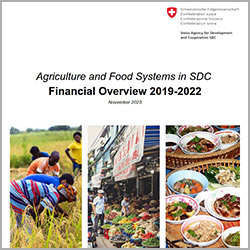 This factsheet provides an overview of the financial disbursements of the Swiss Agency for Development and Cooperation (SDC) in Agriculture and Food Systems during the period 2019 to 2022 and highlights the main financial and thematic trends. Learn more about how the ongoing food crisis and other international development have affected SDC’s work in Agriculture and Food Systems.
This factsheet provides an overview of the financial disbursements of the Swiss Agency for Development and Cooperation (SDC) in Agriculture and Food Systems during the period 2019 to 2022 and highlights the main financial and thematic trends. Learn more about how the ongoing food crisis and other international development have affected SDC’s work in Agriculture and Food Systems.
Read more
Who is who

Fauna Ibramogy Ussumane Rugunato
NPO for Economic Development, SDC Mozambique
LinkedIn | fauna.ibramogy@eda.admin.ch
What do you love, or what is special, about your work?
I consider myself a privileged woman with a family, a decent job, and an education. There are women who do not have all three. I feel the world needs to give them hope and tools to charter their own development. I am passionate about designing and implementing pro-poor development projects which have a lasting and sustainable impact beyond the funding that we provide. My work at SDC therefore revolves around the market systems development (MSD) approach which seeks to empower permanent actors in agricultural value chains to better perform their functions so that the system works better for the poor. This is different from an approach where the projects I manage deliver services to value chain actors themselves, but rather build the capacity of the “systems” to provide these services from within the system. I enjoy engaging with different value chain actors (private and public) to co-design win-win activities. The process of co-designing motivates buy in from these actors which makes the implementation of these activities more feasible. They need to believe they can, through small initiatives that get them going. Lately I have broadened my passion to include marginalized, mostly rural youth, without decent education, no jobs, no assets to start a meaningful livelihood, and no hope in the future. We need them to get meaningful opportunities that allow them to contribute to the development of their communities and countries.
What is your favourite quote and why?
My favourite quote is
“Give a Man a Fish, and You Feed Him for a Day. Teach a Man To Fish, and You Feed Him for a Lifetime.” I like this quote because it aligns with the market systems development work that I do at SDC. The essence of the MSD approach is to ensure that the poor within market systems do not always gave to depend on external support but should be capacitated to fend for themselves in the long run. That is, most externally funded projects have a set timeframe after which they leave and, in most instances, value chain actors will not have developed the capacity to sustain themselves without external support. This quote speaks against this outcome, and always reminds me that in the work I do, I must ensure that both the project design and implementation always have a realistic exit strategy that leaves project partners better off than we found them, and better able to stands on their own without the need for the same level of external support. Additionally, a better way is support them to participate in markets that allows them to build confidence and be an example to future generations. Market systems development should be the buzzword for all agriculture/economic domain projects.
What is the most important lesson you have learned from your work?
The most important lesson I have learnt in my 7 years working at SDC is that sometimes our support has unintended consequences of making our partners expect “free money” instead of an expectation of capacity building. This has made me always be upfront with potential partners to explain our facilitation approach so that they are clear that the objective is not to give them free grants and/or inputs but to support them to afford these services on their own in the long run.
Fauna Ibramogy is an agribusiness specialist with more than 20 years of work experience in agricultural and rural development in Mozambique. Since 2016 she has been a National Program Officer for Economic Development at the Embassy of Switzerland in Maputo, Mozambique. Her role is to provide technical support and managerial guidance to Agricultural value chain and Skill development programmes. She also promotes a gender transformative approach within these programmes and her work has made a significant impact in rural communities across Mozambique. She was responsible for the successful Inovagro and Hortisempre projects that became reference projects for MSD in Mozambique and beyond. InovAgro had a positive impact that culminated in the design of the follow-up project PROMAS. PROMAS will build on InovAgro but also mainstream climate resilience and agroecology practices. She has added youth empowerment through the SIM project, which promotes skills development for rural youth.
Comic
